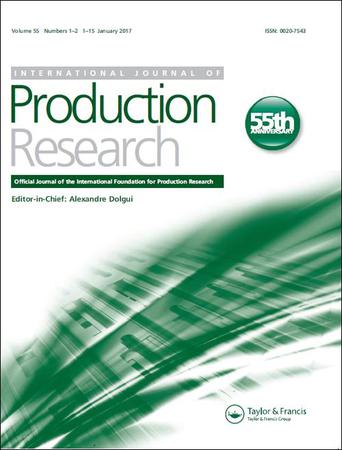实施工业4.0以提高灵活性、质量和生产率:不同目的的技术安排
IF 7
2区 工程技术
Q1 ENGINEERING, INDUSTRIAL
International Journal of Production Research
Pub Date : 2023-10-18
DOI:10.1080/00207543.2022.2142689
引用次数: 4
摘要
摘要生产力、质量和灵活性是采用工业4.0的公司追求的主要生产目标。然而,目前尚不清楚工业4.0技术如何帮助实现这些不同的、有时甚至相互竞争的目标。本研究通过对92家制造商的调查来调查这种关系。该研究采用探索性因素分析法,以18项工业4.0技术为基础,定义了四种主要技术安排:垂直集成、虚拟制造、先进制造加工技术和在线可追溯性。然后,进行了独立样本测试,以比较在追求(或不追求)制造灵活性、工艺质量和生产力作为主要生产目标时,这些安排的实施状况。结果表明,垂直集成是一种通用的技术安排,因为它支持所有目标。另一方面,虚拟制造和在线可追溯性是特定目的的安排,分别适用于灵活性和生产力目标。反过来,先进制造加工技术是一种综合性的技术安排,因为它是在追求生产率和制造灵活性这两个竞争目标时采用的。该研究以一个基于企业可能追求的生产目标的实施工业4.0的决策模型结束。它展示了这些生产目标与所采用的工业4.0技术之间的相互联系和权衡。本文章由计算机程序翻译,如有差异,请以英文原文为准。
Implementing industry 4.0 for flexibility, quality, and productivity improvement: technology arrangements for different purposes
ABSTRACT Productivity, quality, and flexibility are key production targets pursued by companies that adopt Industry 4.0. However, it is unclear how Industry 4.0 technologies can help achieve these different and sometimes competing targets. This study investigates this relationship through a survey of 92 manufacturers. The study employs Exploratory Factor Analysis to define four main technology arrangements based on 18 Industry 4.0 technologies: Vertical Integration, Virtual Manufacturing, Advanced Manufacturing Processing Technologies, and Online Traceability. Then, independent samples tests were conducted to compare the implementation status of these arrangements when manufacturing flexibility, process quality, and productivity are (or are not) pursued as the main production targets. The results show that Vertical Integration is a general-purpose technology arrangement because it supports all targets. On the other hand, Virtual Manufacturing and Online Traceability are specific-purpose arrangements, adopted especially for flexibility and productivity targets, respectively. Advanced Manufacturing Processing Technologies, in turn, is an integrative-purpose technology arrangement since it is adopted when two competing targets are pursued: productivity and manufacturing flexibility. The study ends with a decision model to implement Industry 4.0 based on the production targets a company may pursue. It shows the interconnection and trade-offs between these production targets and the Industry 4.0 technologies adopted.
求助全文
通过发布文献求助,成功后即可免费获取论文全文。
去求助
来源期刊

International Journal of Production Research
管理科学-工程:工业
CiteScore
19.20
自引率
14.10%
发文量
318
审稿时长
6.3 months
期刊介绍:
The International Journal of Production Research (IJPR), published since 1961, is a well-established, highly successful and leading journal reporting manufacturing, production and operations management research.
IJPR is published 24 times a year and includes papers on innovation management, design of products, manufacturing processes, production and logistics systems. Production economics, the essential behaviour of production resources and systems as well as the complex decision problems that arise in design, management and control of production and logistics systems are considered.
IJPR is a journal for researchers and professors in mechanical engineering, industrial and systems engineering, operations research and management science, and business. It is also an informative reference for industrial managers looking to improve the efficiency and effectiveness of their production systems.
 求助内容:
求助内容: 应助结果提醒方式:
应助结果提醒方式:


